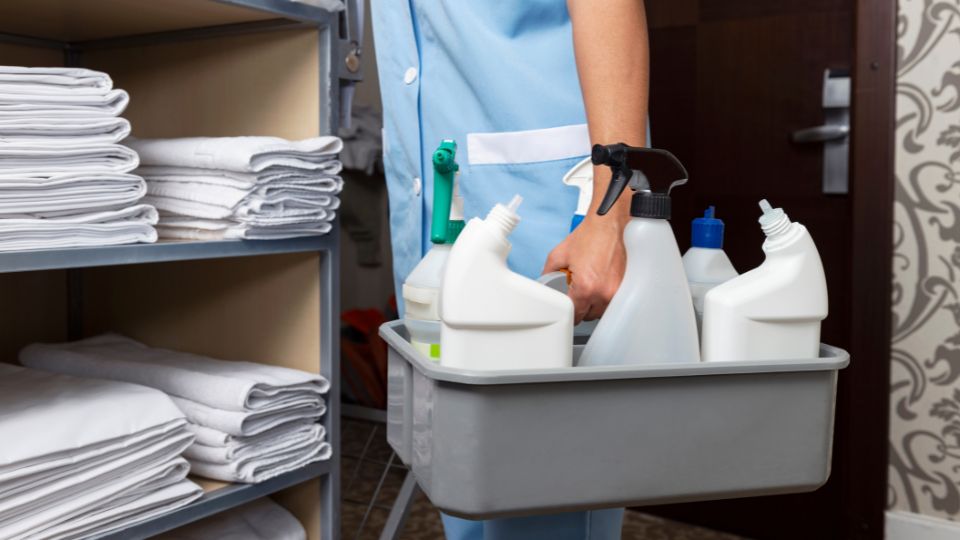
Quick Summary
- UK hotels must follow regulations on waste handling, recycling, and hazardous materials to ensure environmental protection and public health.
- Proper waste management reduces legal risks, lowers landfill costs, and supports sustainability, appealing to eco-conscious guests.
Effective hotel waste management sets a high standard in the hotel sector, demonstrating a commitment to both legal compliance and environmental responsibility.
Managing hotel waste is essential for all hotel owners. It’s not just about complying with the law; it’s also about making a positive impact on the environment.
There are several key regulations you need to be aware of, each designed to promote sustainability and reduce environmental footprints.
Table of Contents
- Environmental Protection Act 1990
- Waste (England & Wales) Regulations 2011
- Hazardous Waste (England & Wales) Regulations 2005
- Landfill Tax Regulations 1996
- The Environment Act 2021
- Why It Matters
Environmental Protection Act 1990

At the heart of UK waste management legislation is the Environmental Protection Act 1990. This Act sets out the framework for regulating waste disposal, ensuring that waste producers – including hotels – handle their waste responsibly.
Hotels have a duty of care under this Act, which means you must manage and dispose of your waste in a way that doesn’t harm human health or the environment.
This involves proper waste segregation, storage, and disposal.
The Act encourages you to adopt environmentally friendly practices and waste minimisation strategies, aiming to reduce the overall environmental impact of your waste.
Waste (England & Wales) Regulations 2011
The Waste (England and Wales) Regulations 2011 is about promoting sustainability and resource efficiency. This requires hotels to separate and recycle waste wherever possible, reducing the amount that ends up in landfills.
You need to implement effective waste management systems that focus on prevention, reuse, and recycling. This means providing clearly labelled bins for different types of waste to help both staff and guests sort their rubbish correctly.
By following these regulations, you can contribute to the circular economy, make better use of resources, and minimise your environmental impact.
Hazardous Waste (England & Wales) Regulations 2005

Handling hazardous waste—such as chemicals, electronic equipment, and medical waste—comes with strict rules under the Hazardous Waste Regulations 2005.
These regulations are designed to protect human health and the environment from potentially dangerous materials.
You must manage hazardous waste carefully, ensuring it’s correctly identified, packaged, labelled, and transported. This often means working with licensed waste carriers or treatment facilities.
Separating hazardous waste from general waste and following proper disposal procedures are key responsibilities for your hotel.
Landfill Tax Regulations 1996
The Landfill Tax Regulations 1996 aim to cut down on waste sent to landfills by imposing a tax on disposal. This tax encourages hotels and other businesses to adopt more sustainable waste management practices.
By increasing the cost of landfill disposal, these regulations push you to explore alternatives like recycling, composting, and energy recovery. This not only helps reduce your tax liabilities but also lessens your environmental impact and conserves natural resources.
You need to keep detailed records of your waste disposal activities and report taxable waste to the relevant authorities.
The Environment Act 2021
The Environment Act 2021 is a key piece of legislation that tackles various environmental issues, including both hospitality waste and hotel waste management. This Act introduces new measures to promote a circular economy, reduce plastic pollution, and enhance recycling infrastructure.
For hotels, this means aligning with new regulations and targets to support a more sustainable and resource-efficient economy.
Staying informed and adopting best practices helps ensure compliance and contributes to a greener future.
Implementing these measures not only demonstrates a commitment to environmental stewardship but also enhances your hotel’s reputation among eco-conscious guests.
Why It Matters
Understanding and following these regulations helps hotels stay compliant and show they’re serious about protecting the environment.
By adopting smart waste management practices, hotels will boost their sustainability and also attract eco-conscious guests and make a positive impact on the planet.
What Can Hotels Do?

- Educate Staff and Guests: Provide training and clear instructions on waste segregation.
- Invest in Recycling Programs: Set up efficient recycling systems and use sustainable materials.
- Monitor and Report: Keep detailed records of waste management practices and stay updated with regulatory changes.
Take proactive steps today to refine your waste management practices. Start by reviewing your current systems, engaging your team in sustainability initiatives, and exploring new recycling opportunities. Together, let’s lead the way in environmental stewardship and make a positive impact on our planet!








